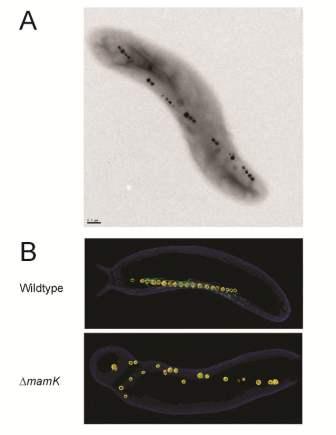Nicole Abreu’s journey reflects hard work, persistence and strong support
Graduate Student Nicole Abreu has been awarded a prestigious research fellowship and will receive up to $21,000 annually over the next three years to continue her work on how bacteria function at a cellular level.
The American Society for Microbiology Robert D. Watkins Graduate Research Fellowship is aimed at highly competitive graduate students who are enrolled in a Ph.D. program and have completed their graduate course work in the microbiological sciences. The award is the culmination of much hard work on Abreu's part, and illustrates the multi-faceted persistence required to be an outstanding graduate student.
How Protein Behaves
Abreu, a 4th year graduate student in the Komeili Lab in the Department of Plant & Microbial Biology, has been studying the way in which magnetotactic bacteria organize their magnetic organelles, magnetosomes, into chains in the cell. In particular, she has been focusing on MamK, a protein that forms filaments and is required for organizing the magnetosome chain.
"Her proposed research will show us how this protein behaves in the cell and how it functions to assemble the magnetosome chain. More broadly, her work will be relevant to others studying cellular organization in bacteria," Komeili said. Understanding bacterial cellular function may prove especially useful in areas like medicine, where pathogen research and treatment is highly valuable.
Obtaining Funding
Like professors, graduate students must hone and develop the skills necessary to obtain funding for their research. After years of study and hard work Abreu is well-versed in what is required. Her journey is not just one of pen and wits, but of money. Graduate students, post-docs, and professors alike all have to compete for grants and fellowships to fund their studies.
Abreu's academic journey started at UC Santa Cruz, where she earned a B.A. in cellular and molecular biology. A first-generation college student in her family, her strong interest in biomedical sciences drove her to work in a handful of academic research labs and healthcare centers, both throughout her college years and during her time before graduate school. Working closely with patients, she developed an interest in microbiology.
This led her to research aspects of the human microbiome in the Susan Lynch lab at UC San Francisco. “It was fascinating to see how different the microbiome can be between healthy and diseased patients,” Abreu said. Lab research and observations in the field propelled her to take her microbiology education to next level. She has been in the Komeili Lab for 4 years, and the grant assures funding for the remainder of her time til she gets the Ph.D., expected in 2015.
"Fantastic Student"
"Nicole is a fantastic student and has worked hard to develop her projects," Komeili said. "She is not only a fantastic scientist but also a great lab citizen and has been a key figure in creating an open and collaborative environment in the lab. The Watkins fellowship recognizes the importance of her work to date but also her potential to succeed in the future. I am extremely proud of her and feel lucky to have her in my group."
Though Abreu has won this particular battle, more remain. The competitive struggle for grants, fellowships, and jobs – in both industry and academia – persists. Despite this inevitable pressure, she is open-minded and passionate about her work. With a supportive lab and easily accessible resources from a tightly knit microbiology department, Abreu can focus on her research, studies and teaching.
Related Links
American Society for Microbiology Robert D. Watkins Graduate Research Fellowship

